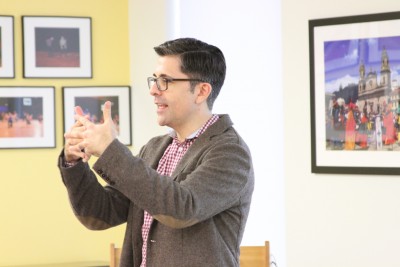For undocumented students in the United States, each step in the college application process can pose a challenge, says University of Hartford faculty member H. Kenny Nienhusser.

Nienhusser, an assistant professor of educational leadership at the University of Hartford, met last month with students in the Neag School’s higher education and student affairs program as part of assistant professor Milagros Castillo-Montoya’s multicultural course. Nienhusser focused his discussion on the need for high school and college faculty and administration to reshape their behavior in order to help make college a reality for undocumented students.
Many high school and college educators, he says, have not been trained in how to counsel undocumented students in transitioning to college. This lack of training, he adds, often creates an absence of empathy for these students as they face the challenging college application process.
“If you’re not mindful and aware of what it means to be an undocumented student, you won’t be able to translate this concept of understanding into your practice,” Nienhusser says.
From the Student Perspective
Nienhusser’s most recent study examined the types of microaggressions undocumented students face during the college-choice process. The qualitative study zeroed in on 15 New York City high school students from Hong Kong, South Korea, Mexico, and Latin America in their high school-to-college transition.
The research found each microaggression – typically initiated by guidance counselors, admission and financial aid representatives, teachers, and administrators – to be a subtle denial of a student’s college opportunities.
Four UConn students representing CT Students for a Dream (C4D), an organization working to grant undocumented students Deferred Action for Childhood Arrivals (DACA) status and make attending college more attainable, supported Nienhusser’s research findings with their firsthand experience.
“It’s hard to complete the [college] application and tax information when your parents can’t help you because they don’t speak English,” C4D member Eric Cruz-Lopez ’18 (CLAS) says. “You’re forced to make this life-changing decision on your own, without help from the institution you’re applying to.”
It is also harder for undocumented students to afford college. While many states grant in-residency state tuition, not many grant financial aid. In Connecticut, however, students must be enrolled in high school for two years (not four years, as the law stood previously) to be eligible for in-state tuition, a policy changed with the help of C4D.
Being active in the policymaking process is something C4D member Renato Muguerza ’17 (CLAS) says is essential to improving the future for undocumented students.
“Undocumented people need to be present at the table when making decisions,” Muguerza says.
Held at UConn’s Puerto Rican/Latin American Cultural Center, Nienhusser’s talk was titled “Undocumented Students’ Postsecondary Education Access: The Role of Policies and Institutional Agents in High Schools and Higher Education Institutions.”
 Facebook
Facebook
 Twitter
Twitter
 LinkedIn
LinkedIn
